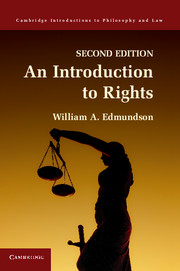Book contents
- Frontmatter
- Contents
- Preface to the First Edition
- A Note on the Second Edition
- A Note on Citation Form
- List of Tables
- Part One The First Expansionary Era
- Part Two The Second Expansionary Era
- 6 The Universal Declaration, and a Revolt Against Utilitarianism
- 7 The Nature of Rights
- 8 A Right to Do Wrong? Two Conceptions of Moral Rights
- 9 The Pressure of Consequentialism
- 10 What Is Interference?
- 11 The Future of Rights
- 12 Conclusion
- Bibliographical Notes
- References
- Index
11 - The Future of Rights
from Part Two - The Second Expansionary Era
Published online by Cambridge University Press: 05 June 2012
- Frontmatter
- Contents
- Preface to the First Edition
- A Note on the Second Edition
- A Note on Citation Form
- List of Tables
- Part One The First Expansionary Era
- Part Two The Second Expansionary Era
- 6 The Universal Declaration, and a Revolt Against Utilitarianism
- 7 The Nature of Rights
- 8 A Right to Do Wrong? Two Conceptions of Moral Rights
- 9 The Pressure of Consequentialism
- 10 What Is Interference?
- 11 The Future of Rights
- 12 Conclusion
- Bibliographical Notes
- References
- Index
Summary
We have been exploring the twentieth-century effort to understand the nature of rights and to locate their moral footing. But this intellectual enterprise is at best only a part of the story. As we noted in Chapter 6, the 1948 Universal Declaration of Human Rights inaugurated a second expansionary period of rights discourse. The expansionary tendency of rights discourse was held in check for at least a decade and a half, however, by the global standoff between the West and the Soviet bloc – the Cold War. Owing, in part, to the expanse of the rights set forth in the 1948 Universal Declaration, both sides in the Cold War could draw on the Universal Declaration for propaganda purposes. The West emphasized the denial of political rights in the Communist world, while the Communists pointed to the economic insecurity and inequality tolerated in the West, as well as the residual injustices of colonialism – including apartheid in Africa and racial segregation in the southern United States. Given the tension and hostility between the parties, there was more than ample incentive to propagandize. A seeming stalemate between propaganda and counter-propaganda was broken, however, by a series of developments, which included decolonization by the Western powers, the dismantling of official racial segregation in the United States, and the diplomatic isolation of apartheid South Africa. The turning point may have been the Helsinki Final Act of 1975, a set of accords between the West and the Soviet bloc which had the effect of enabling non-governmental organizations (NGOs) based in the West to monitor Soviet and Eastern European compliance with agreements to respect their citizens’ political rights. The dissolution of the Soviet bloc in 1989 and of the Soviet Union itself in 1991 ended the Cold War. The movement for human rights could rightly claim to have catalyzed all of these events, on both sides of the “iron curtain” dividing East and West; and these events seemed to signal the approach, if not the arrival, of a global consensus about the priority, as well as the universal existence, of a set of political and civil rights.
- Type
- Chapter
- Information
- An Introduction to Rights , pp. 140 - 159Publisher: Cambridge University PressPrint publication year: 2012

